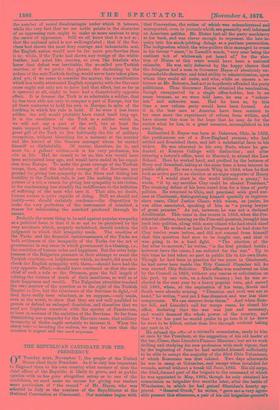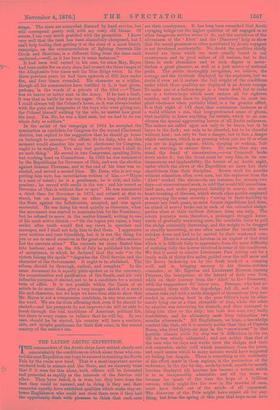THE REPUBLICAN CANDIDATE FOR THE PRESIDENCY.
ON Tuesday next, November 7, the people of the United States elect their President. As it is only less important to England than to his own country what manner of man the chief officer of the Republic is likely to prove, and as public opinion with us has gone altogether astray as to one of the candidates, we need make no excuse for giving our readers some particulars of "the record" of Mr. Hayes, who was selected in July as the nominee of the Republicans at the National Convention at Cincinnati. Our mistakes began with that Convention, the action of which was misunderstood and misreported, even in journals which are generally well informed on American politics. Mr. Blaine had all the party machinery at his back, and was clever enough to represent the late in- quiry into his stock-jobbing doings as a partisan persecution. The indignation which the wire-pullers thus managed to rouse in his favour "came," in Lowell's words, "very near being the costliest tub of whitewash yet heard of," for the elec- tion of Blaine at this crisis would have been a national calamity. He was only defeated by the happy chance that the delegates had a man in Governor Hayes of absolutely un- impeachable character, and tried ability in administration, upon whom they could all unite, and who, while as sincere a re- former as Mr. Robeson, had not so hopelessly offended the party politicians. Thus Governor Hayes obtained the nomination, though unsupported by a single office-holder, but in no sense because, as we were told here, he was a " colour- less " and unknown man. Had he been so, by this time a new reform party would have been formed. As it is, the best men in America have been content to try once more the experiment of reform from within, and have chosen this man in the hope that he may do for the nation what he has, in a great measure, accomplished in his own State.
Rutherford B. Hayes was born at Delaware, Ohio, in 1822, the posthumous son of a New-England yeoman, who had settled and flourished there, and left a substantial farm to his widow. He was educated in his own State, where he gra- duated at Kenyon College with distinction ; and after entering a lawyer's office, went to Harvard, to attend the Law School. Here he worked hard, and profited by the lectures of Story and Greenleaf, taking at the same time a keen interest in public affairs. He was a staunch Whig in 1844, when he first took an active part in an election as an eager supporter of Henry Clay. "I would start in the world without a penny," he wrote, "if by my sacrifice Clay could be elected President." The crushing defeat of his hero cured him for a time of party politics. He returned to Ohio, and practised with good sue- c,ess at Cincinnati, distinguishing himself specially in fugitive- slave cases, Chief Justice Chase, with whom, as junior, he was often associated, speaking of him as "a young lawyer of great promise." As yet, however, he was not a declared Abolitionist. This came in due course in 1856, when the Pre- sidential election, turning on the Free-soil question, brought him back into politics, along with many others who had stood aloof till now. He worked as hard for Fremont as he had done for Clay twelve years before, and did not conceal from himself that this question had now to be fought out, and that it was going to be a hard fight. "The election of the day after to-morrow," he writes, "is the first pitched battle ; however fares the cause, I am enlisted for the war." Up to this time he had taken no part in public life in his own State. Though he had been in practice for ten years in Cincinnati, he had never been inside the City Council Chamber till he was elected City Solicitor. This office was conferred on him by the Council in 1856, without any canvas or solicitation on his part, by one vote, on a death vacancy ; but he was re- elected in the next year by a heavy popular vote, and served till 1861, when, at the expiration of his term, North and South were already arming. "Disunion and civil war are at hand," he writes, "and yet I fear disunion and war less than compromise. We can recover from them." And when Sum- ter fell, and Lincoln's call for troops came, he closed his office, declaring that the war was just and necessary, and would demand the whole power of the country, and that "for his part he would prefer to go into it if ba knew he were to be killed, rather than live through without taking any part in it."
He refused the ar— of a colonel's commission, made to him at once by the President, at the suggestion of his old leader at the bar, Chase, then Lincoln's Finance Minister; but set to work drilling and studying his new profession with such vigour, that by the beginning of June he had satisfied himself sufficiently to be able to accept the majority of the 23rd Ohio Volunteers, of which Rosecranz was first colonel. Two days afterwards he was in camp at Columbus, and except when invalided for wounds, served without a break till June, 1865. His old corps, the 23rd, formed part of the brigade to the command of which he was appointed in May, 1864, though he only obtained his commission as brigadier five months later, after the battle of Winchester, in which he had gained Sheridan's hearty ap- proval. "General Crook," he writes, "gave me a very agree- able present this afternoon, a pair of his old brigadier-general's straps. The stars are somewhat dimmed by hard service, but will correspond pretty well with my rusty old blouse. Of course, I am very much gratified with the promotion. I know very well that the rank has been shamefully cheapened, but I can't help feeling that getting it at the close of a most bloody campaign, on the recommendation of fighting Generals like Crook and Sheridan, is a different thing from the same rank conferred,—well, as it has been in some instances."
It had been well earned in his case, for since May, Hayes 7"..‘ had been under fire on sixty days, had crossed the three ranges of the Alleghenies four times and the Blue Ridge twice. In the three previous years he had been upwards of 600 days under fire, and four times wounded. His character as a soldier, though all his commanders have testified to it, is best given, perhaps, in the words of a private of the 23rd :—" There was no braver or better man in the Army. If he had a fault, it was that in battle he was too eager. On a long dusty march I could always tell the Colonel's horse, as it was always loaded with the guns and knapsacks of the boys who were giving out, the Colonel himself walking by the side, no matter how great the heat. Yes, Sir, he was a kind man, but we had to do our whole duty as soldiers." In the midst of the campaign of 1864 he accepted the nomination as candidate for Congress for the second Cincinnati district, but replied to the suggestion that he should go home on furlough to canvas,—"An officer, fit for duty, who at this moment would abandon his post to electioneer for Congress, ought to be scalped. You may feel perfectly sure I shall do no such thing." He served in two Congresses, speaking little, but working hard on Committees. In 1869 he was nominated by the Republicans for Governor of Ohio, and won the election against Senator Thurman, and at the end of his time was re- elected, and served a second time. Mr. Dana, who is not sup- porting him now, has nevertheless written of him :—" Hayes is a man of talent ; he is a gentleman, he is rich, and inde- pendent; he served with credit in the war ; and his record as Governor of Ohio is without flaw or spot." He was nominated a third time for Governor in 1875, and refused at first to stand, but on hearing that no other name could carry the State against the Inflationists, accepted, and was again successful. He was doing his work quietly as Governor, when the movement was started to nominate him for the Presidency, but he refused to move in the matter himself, writing to one of his most active friends :-■.-44 On the topics you name, a busy seeker after truth would find my views in speeches and messages, and I shall not help him to find them. I appreciate your motives and your friendship, but it is not the thing for you or me to enrol ourselves in the great army of office-seekers. Let the currents alone." The currents let alone floated him into harbour, and on the 8th of July he published his letter of acceptance, in which he declared that the rule "to the victors belong the spoils" "degrades the Civil Service and the character of the Government It ought to be abolished. The reform should be thorough, radical, and complete." In the same document he is equally plain-spoken as to the currency, the reconstruction and pacification of the South, and his own inflexible purpose, if elected, not to be a candidate for a second term of office. It is not possible within the limits of an article to do more than give a very meagre sketch of a man's life and. character, but we hope we have been able to show that Mr. Hayes is not a compromise candidate, in any true sense of the word. We are far from affirming that, even if he should be elected—and his prospects do not improve—he will be able to break through the bad traditions of American political life, but there is every reason to believe that he will try. In any case, should he be elected, his country will have a resolute, able, and upright gentleman for their first ruler, in the second century of the nation's lifo_



































 Previous page
Previous page